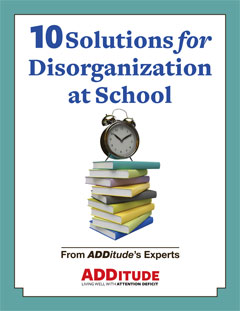The school environment changes in the middle years. Instead of loads of structure and guidance, as your child had in elementary school, students are expected to manage more of their life on their own. At the same time, the students themselves are changing. They are less motivated to please adults and more motivated to impress peers. As they search for their own identities, the social scene becomes more important. It is a confusing time for students with ADHD, but with the right support, they can thrive!
ORGANIZATION
What Teachers Can Do
USE MINIMAL SUPPLIES. The worst thing to do to an ADHD student is to saddle him with a bunch of tools to manage and organize. Let students combine all their folders and notebooks into one binder. Inside the binder, they can organize their papers and notes by subject, using vinyl binder folders.
MAKE PLANNERS MANDATORY. Tracking due dates and test dates is key to success in school. How many times have you seen smart kids fail because they forgot about a test and showed up unprepared? Everyone's memory fails sometimes, but students with ADHD have the most to gain by writing things down. They must develop the habit of recording their assignments and important dates. Discuss transition points (switching classes or going home), the times throughout the day when students should use their planners. Encourage them to use their planners; make it part of their grade.
PROVIDE DESK ORGANIZERS to help children locate materials and tools.
DO BAG CHECKS. Randomly check book bags for extra credit. Award points for bags with no loose papers, no trash, and assignments in folders.
DO LOCKER CHECKS. Check lockers during homeroom. Make sure all trash is removed. Have students create three piles of books in their locker: morning books lying flat, afternoon books standing on their spine, and books for homework on the bottom of the locker.
No More Forgotten Papers or Missed Deadlines! 11 Ways to Get Organized
What Parents Can Do
GIVE YOUR CHILD A PLANNER. Make sure your child has a thin, spiral-bound planner. The format inside should let him see a full week at a glance, and should also include a monthly calendar. The right planner is the first step toward keeping track of due dates and appointments. There is too much going on in middle school to keep it all in your head! A planner works only if it's used every day. Discuss the times throughout the day when she should be using the planner, and check it each evening. Consider providing a reward or incentive to help get her started.
TAKE TWO -- two minutes, that is, to organize papers every day. As your child begins homework each evening, have him take the first two minutes to clean papers out of his bag and organize them into folders. This simple habit helps students transition into doing homework.
ESTABLISH A HOME PAPER STATION. When folders get full, students need to clean them out. But they should hold onto returned notes and assignments; these become valuable study guides.
AVOID MORNING MAYHEM. Have your child pack his bag every night, using his planner to verify that nothing is left out.





